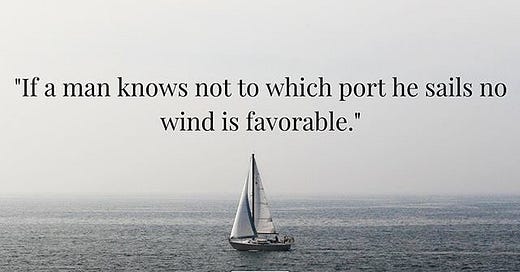Friday Notes, July 23, 2021
Dear Friends –
The hard part about sailing is not choosing the destination. The hard part is figuring out how to and when to let out and haul in the sails – playing the resistance of wind on canvas – so that you move in the intended direction. It is watching the strings of yarn attached to the jib and mainsail, the telltales, so you can anticipate the wind. It is keeping your eye on the compass, the waves, the shoals, and the other boats. And, in a boat large enough to require a crew, it’s directing the action with the right words at the right time.
That’s why I loved hearing this advice recently: think of strategy and its implementation as sailing, not as operating a motorboat. It’s such a perfect way to capture the reality that we control only a few levers, and we have to use those to make the most of the conditions around us. You don’t control which direction the wind is blowing, but you orient your sails differently depending on whether the wind is blowing in your face or is at your back. This metaphor conveys that the skill resides not in charting the straightest line to the destination while sitting on shore, but in how well you tune into the weather and make decisions moment by moment along the way. Just so.
A lot of empirical research in low- and middle-income countries (and probably many other places) has long been characterized by unequal power relationships and inadequate accountability both to communities that are the subject of research and to research teams collecting data. The norms and standards are changing, albeit not fast enough.
A recent contribution to those changes is “A call for structured ethics appendices in social science papers,” by Edward Asiedu and colleagues. They push the field of randomized impact evaluations (“field experiments”) forward by pressing researchers publishing in peer-reviewed journals to answer these questions (paraphrasing informally):
Are we truly uncertain about whether the intervention we’re studying will benefit the individuals participating in the research?
Are the resources for the intervention truly scarce, so that creating a “control group” is not depriving people who otherwise would have had the chance to benefit?
If the researchers designed or directed the intervention itself – in addition to the research on the effectiveness of the intervention – did the design and implementation of the intervention pass ethical scrutiny?
Have potential harms to participants, non-participants, and research team members been considered and mitigated?
Have informed consent standards been met both at the individual and community level?
Do the researchers have financial or reputational conflicts of interest?
Are there contractual obligations around disclosure of findings?
Is there a plan for communicating results of the study to participants?
Is there a foreseeable risk of misuse of the study findings?
While some of these questions reinforce ethical review requirements already in place, several truly lift the bar. Among those, the first – what the authors call “policy equipoise” – is a direct challenge to research that is justified simply on the basis of being academically interesting and/or feasible. The third shines in interrogation light on researcher-driven program design, a common practice in which an investigator designs and then test a new intervention that may be based on prior literature or curiosity about how a theory works in the real world. In that case, what are the bounds of the ethical assessment? And the penultimate question, about sharing results with research participants, nudges many of us into unfamiliar but important territory. All in all, a very welcome new standard.
And now, for the first time ever in one of these weekly notes, a few of my favorite real estate listings:
A house in Rydal, PA, that is disguised as a typical suburban dwelling.
What a million dollars gets you in East Palo Alto, California.
What $30M gets you in Palo Alto – the ultimate “work from home” situation.
A “get away from it all” house in Pueblo, CO, post-apocalypse style.
Have a good weekend,
-Ruth



